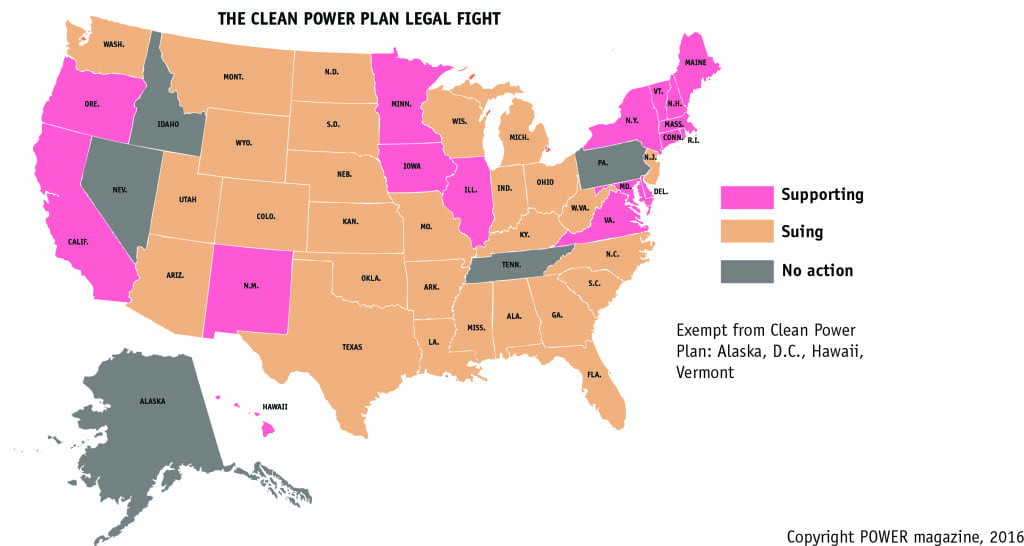Don’t Let EPA Stall on Clean Power Plan, 17 States Tell Federal Court
The Environmental Protection Agency's (EPA's) recent request that the D.C. Circuit hold a case challenging the Clean Power Plan in additional abeyance until it concludes rulemaking has been strongly opposed by 17 states and several cities.
The EPA, in its latest 30-day court-required status report filed on January 10, asked the federal court for continued abeyance of the massive case. The court heard oral arguments on the merits of the Obama administration's legacy rule to curb carbon dioxide emissions from power plants 16 months ago.
But in a joint filing with the court on January 17, 17 states-California, Connecticut, Delaware, Hawaii, Illinois, Iowa, Maine, Maryland, Massachusetts, Minnesota, New Mexico, New York, Oregon, Rhode Island, Vermont, Virginia, and Washington-along with the District of Columbia, New York City, Florida's Broward County, Boulder (Colorado), Chicago, Philadelphia, and South Miami, urged the court to deny additional abeyance.
"Neither EPA's proposed repeal of the Clean Power Plan nor its prolonged and uncertain plans to replace the rule justify additional abeyance," the parties argued.
New Rule in the MakingWest Virginia v. Environmental Protection Agency (No. 15-1363) involves numerous consolidated petitions of review of the Clean Power Plan, pitting a coalition of 27 states and numerous energy producers, utilities, and trade organizations against the EPA, 18 states, and a host of environmental groups. The Supreme Court granted an unprecedented stay of the rule pending judicial review in February 2016, and the D.C. Circuit heard oral arguments en banc in September 2016.
In March 2017, however, President Trump issued an executive order for executive departments and agencies to review, revise or rescind rules that "burden domestically produced energy resources," prompting EPA Administrator Scott Pruitt to announce that the EPA would review the Clean Power Plan. In April 2017, the D.C. Circuit held the consolidated cases in abeyance for 60 days, and ordered the EPA to file status reports every 30 days on its review of the rule. In August, the court extended the abeyance for another 60 days, and again in November 2017, even as Pruitt formally issued a notice that the EPA would repeal the Clean Power Plan on the grounds that it exceeds the agency's statutory authority.
Two weeks after Pruitt on December 7 told House lawmakers that the agency will introduce a rule to replace the Clean Power Plan, he signed an advance notice of proposed rulemaking (ANPR) soliciting information on systems of emission reduction that are in accord with the legal interpretation proposed by the EPA. The notice was published in the Federal Register on December 28, and comments are due on February 26.
To date, only 18 comments have been received in the indicated docket, EPA-HQ-OAR-2017-0545.
A Lengthy Two YearsOn Wednesday, meanwhile, the coalition of states and cities told the D.C. Circuit that the EPA's latest request for abeyance of the litigation is based on its proposed repeal of the Clean Power Plan, which cannot occur without a replacement, or the EPA would violate its statutory duty to regulate carbon dioxide from existing power plants, the parties argued. At the same time, the EPA has extended public comment on its proposed repeal until April 26-which "means it is unlikely the agency will complete repeal until late 2018 at the earliest, more than two years after en banc argument in this case," they said.
The EPA's recently issued ANPR doesn't warrant further abeyance either, the parties said. That "preliminary regulatory tool" is "patently inappropriate in these circumstances, where there has already been extraordinarily lengthy regulatory process, the agency possesses thousands (if not millions) of relevant comments, and 'the Nation's most important and urgent environmental challenge' is awaiting long overdue action," they added.
The joint filing notes that the ANPR itself does not suggest that the EPA is planning "prompt and meaningful steps" to replace the Clean Power Plan. The agency had not even provided the court with deadlines for progressing from advance notice to a promulgated rule, it adds.
-Sonal Patel is a POWER associate editor (@sonalcpatel, @POWERmagazine)
The post Don't Let EPA Stall on Clean Power Plan, 17 States Tell Federal Court appeared first on POWER Magazine.
